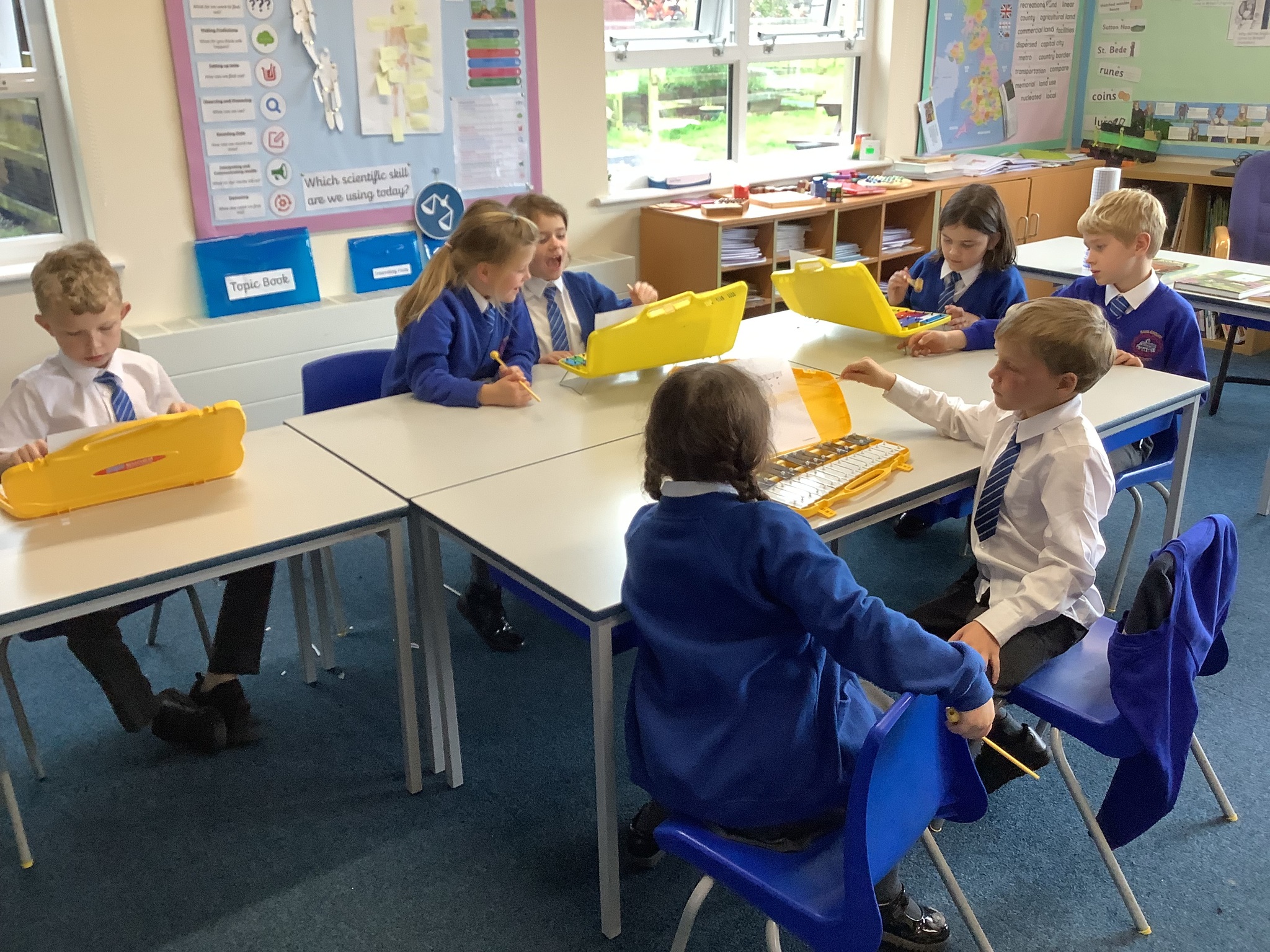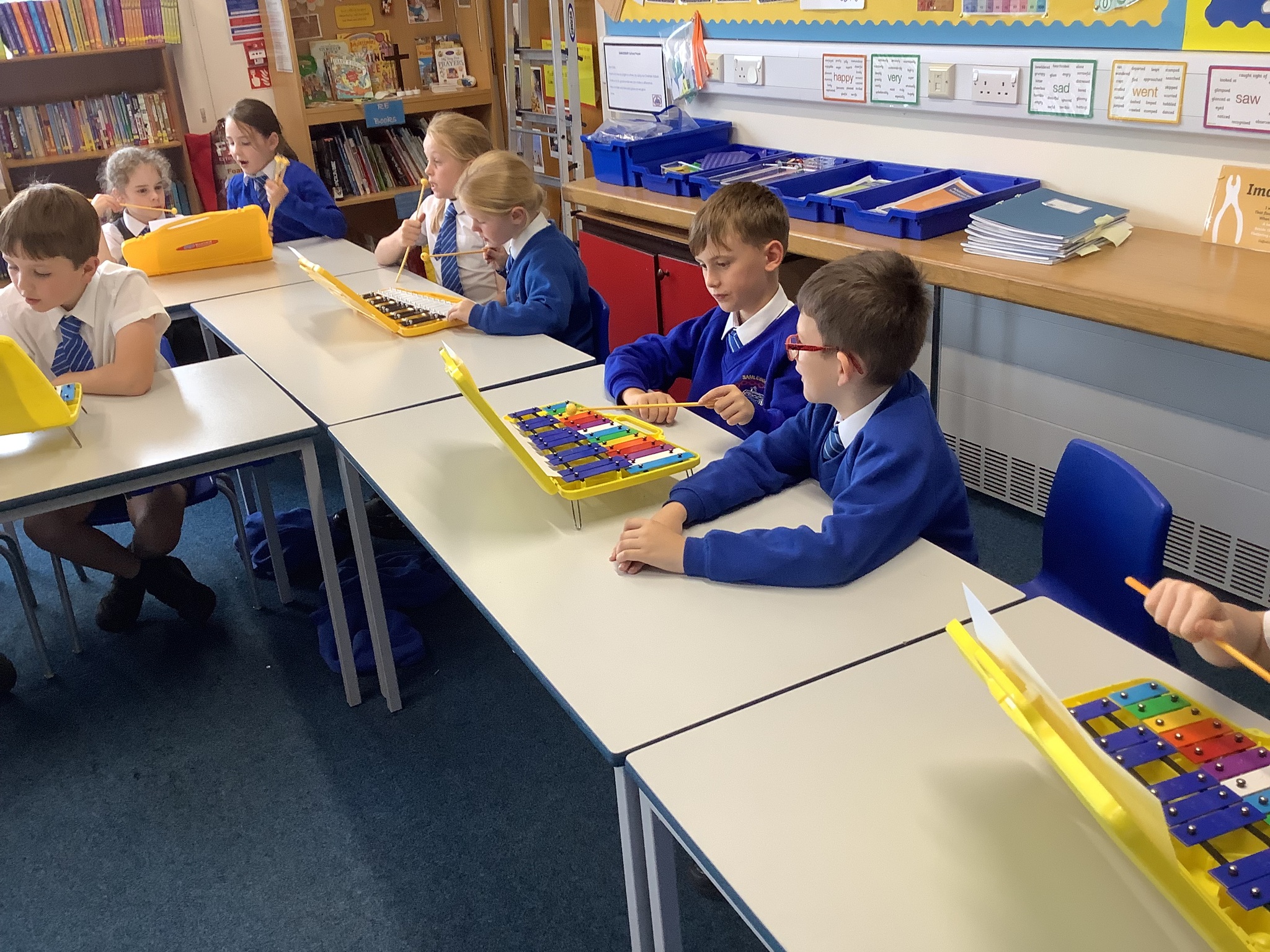Click here to read our Music Development Plan.
Intent, Implementation and Impact Statement
Intent
At Samlesbury CE Primary School, it is our intention to provide all children with a music curriculum that ensures the progression of skills, providing the opportunity to gain a firm understanding of what music is through listening, singing, playing, evaluating, analysing, and composing across a wide variety of historical periods, styles, traditions, and musical genres. In doing this we hope to give our children the skills they need to become confident performers, composers and listeners.
Our curriculum introduces children to music from all around the world and across generations, teaching children to respect and appreciate the music of different traditions and communities. They will also develop an understanding of the history and cultural context of the music that they listen to and learn how music can be written down.
We want all children to have the opportunity to play an instrument, to make music with others and to have the opportunity to progress to the next level of their creative excellence.
We aim to provide children with the knowledge and skills to progress to the next level of their musical journey, as well develop areas such as team-working, leadership, creative thinking, problem-solving, decision-making and performance skills. These transferable skills are vital to children’s development as learners and have a wider application in their general lives outside and beyond school.
Implementation
In accordance with the National Curriculum and Music Model Curriculum, we ensure that coverage of knowledge and skills is developed sequentially throughout school. To this extent, we have adopted Kapow Primary’s Music which takes a holistic approach to music, in which the individual strands below are woven together to create engaging and enriching learning experiences:
· Performing
· Listening
· Composing
· The history of music
· The inter-related dimensions of music.
Each unit with Kapow Music comprises of five lessons which combine the above strands within a cross-curricular topic to capture children’s imagination and encourage them to explore music enthusiastically. In each lesson, pupils will actively participate in musical activities drawn from a range of styles and traditions, developing their musical skills and their understanding of how music works.
Throughout their time at Samlesbury, children will be taught how to sing fluently and expressively, to play tuned and untuned instruments accurately and with control. They will learn to recognise and name the inter-related dimensions of music – pitch, duration, tempo, timbre, structure, texture and dynamics as well as using these expressively within their own improvisations and compositions.
We aim to introduce the teaching of recorders in Years 3 and 4 as a whole class instrumental opportunity.
In addition to the weekly music lesson as part of curriculum time, pupils are also offered opportunities beyond the National Curriculum to further and support their musical learning. These include the opportunity to take up an instrument through peripatetic lessons (we currently have pupils learning the keyboard and drums), participating in external events, school productions, planned opportunities to enhance their listening repertoire (such as ‘Composition of the Week’ during worship) and having visitors with a musical talent or linking to online performances. External interests and talents are also encouraged and showcased in class and worship, ensuring that everyone is challenged regardless of previous musical experience.
Impact
Through implementing the above, pupils will leave Samlesbury:
· as confident performers, composers and listeners, able to express themselves musically at and beyond school.
· showing an appreciation and respect for a wide-range of musical styles from around the world and will understand how music is influenced by the wider cultural, social and historical contexts in which it is developed.
· understanding the ways in which music can be written down to support performing and composing activities.
· demonstrating and articulating an enthusiasm for music, being able to identify their own personal musical preferences.
· meeting the end of key stage expectations outlined in the National Curriculum for music.
The impact of music teaching is continually monitored by staff to ensure children are progressing as they should. The subject leader is available to guide staff where pupils are not making expected progress in music (either to support or challenge).
Links to further information and support
Please CLICK HERE to access our Whole School Music Curriculum Overview.
Each week in whole school worship we start and finish our worship by listening to a composition of the week and finding out more about the music, the composer as well as what else was happening in the world at that time. You can see and hear the music we are listening to this term by CLICKING HERE.




